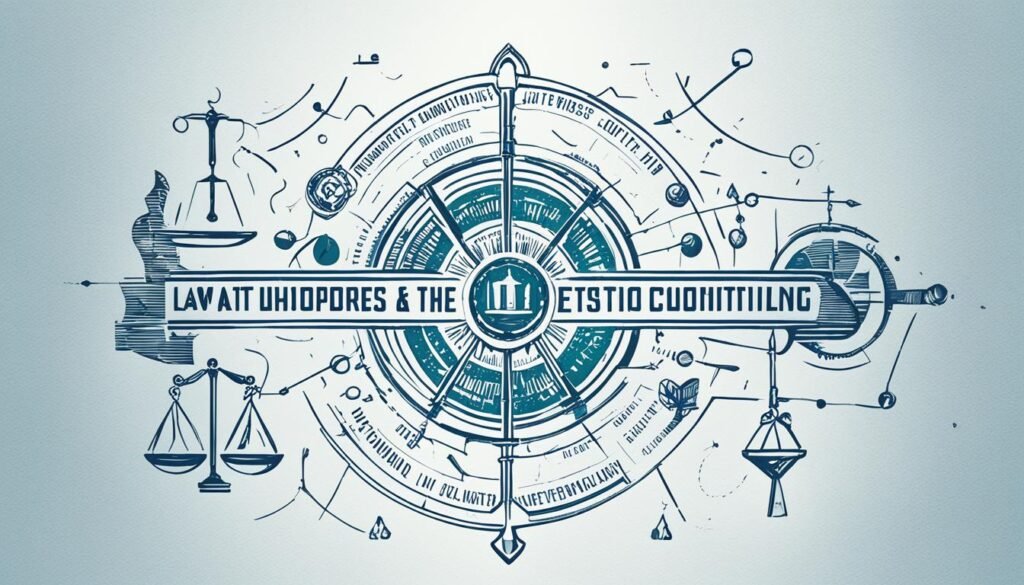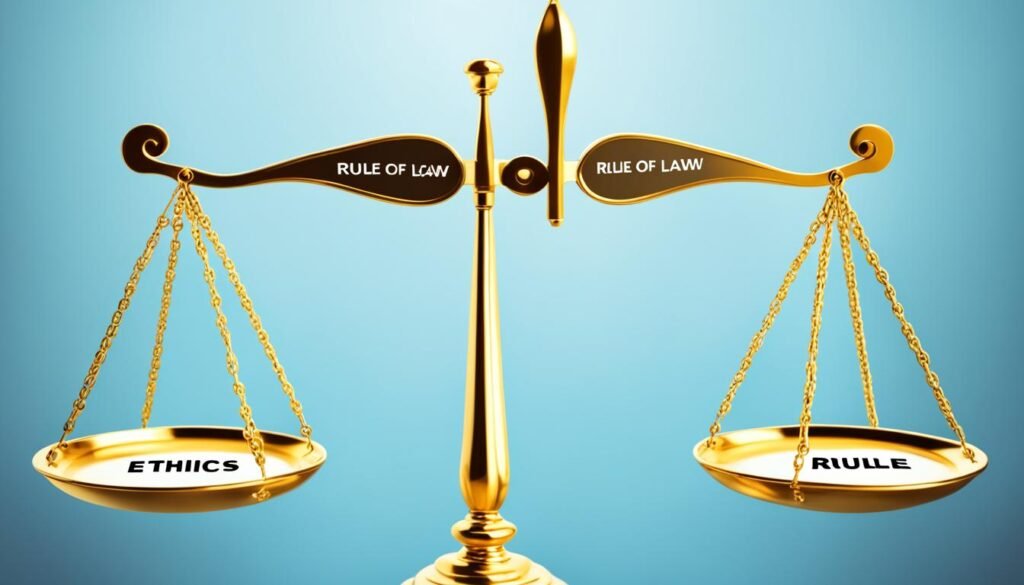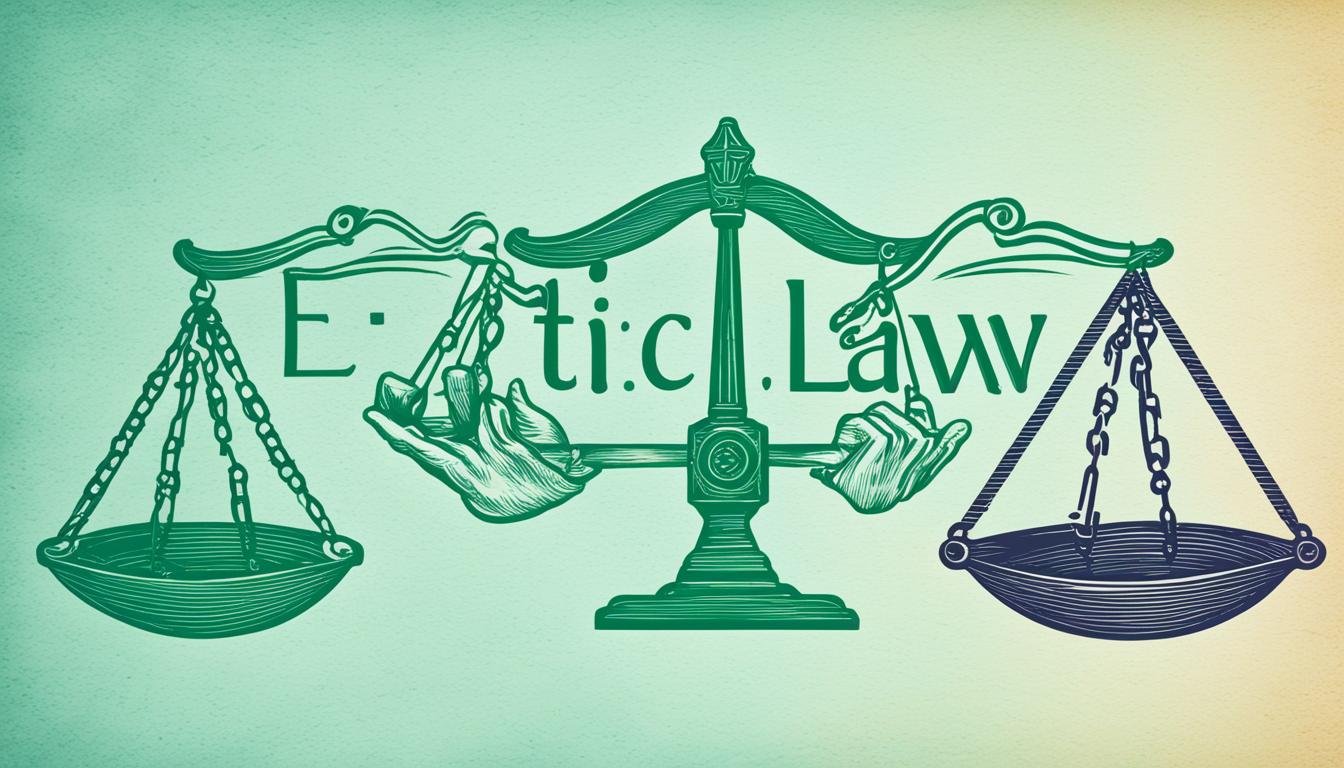The legal profession plays a key role in keeping our society just and ethical. Lawyers stand as the key protectors of rule of law and ethical standards. They bridge the gap between clients and the legal system. The Legal Services Board notes that there are seven crucial ways legal professionals support the rule of law.
The connection between law and ethics is critical. Although laws are set for everyone, ethics are more personal. They’re shaped by one’s family, beliefs, and culture. Despite this, the two, law and ethics, are closely connected. Legal bodies guide lawyers on following the rule of law while making ethical choices.
Key Takeaways
- Lawyers are essential for maintaining the rule of law and preventing misuse of power outside the government.
- Moral actions in legal matters can reduce court mistakes, ensure trials are fair, and keep justice open to all.
- The rule of law is based on four core principles: accountability, fair laws, transparent government, and justice that’s always available and unbiased.
- Lawyers have to think about both their legal duties and what’s right, to keep the justice system honest and fair.
- Upholding the rule of law and staying ethical is vital for a healthy democracy and for making society fair for all.
Understanding the Intersection of Law and Ethics
The rule of law and ethics connection is key in any constitutional democracy. Legal and ethical principles guide our actions. They ensure judicial integrity, protect human rights, and promote social justice.
Defining Law and Ethics
The law is about rules that keep society in order. It’s set by the government and enforced by social institutions. Ethics, however, is personal. It’s about the moral values that guide our decisions. These include our moral compass and sense of integrity.
The Complementary Relationship Between Law and Ethics
The law and ethics both set boundaries. The law is what we must follow, while ethics is about what we believe is right. Yet, they work together. They ensure good governance, social justice, and accountability. Laws show a society’s ethics, and ethics can influence laws.
In a constitutional democracy, judicial integrity and human rights are key. Legal and ethical principles join here. They help keep a society stable and just.

“The rule of law is the bedrock of a just and equitable society, but it is the ethical foundation that gives the law its moral authority and legitimacy.”
In our complex world, understanding law and ethics is crucial. Every business and individual must act ethically. They need to follow the law and keep their standards high.
The rule of law and ethics connection in Practice
In the business world, formal compliance programs succeed when the company’s culture is right. Employees need help to tackle ethical problems in tough situations. They face many priorities and demands. It’s vital to have an open culture where speaking up is encouraged. Managers should know how to talk about ethical problems and making good choices.
It’s clear that law and ethics go hand in hand in real life. Norway and New Zealand do best when it comes to the rule of law. In contrast, Zimbabwe and Afghanistan are at the bottom. Assessing how well countries follow the rule of law helps companies judge the risk of investing there. The World Justice Project looks into how laws are used in different places.
Many groups measure how well the rule of law is practiced in various countries. Country rankings reflect how good their democratic and judicial systems are. They also show how much a country cares about human rights and morals. Proper enforcement of the rule of law links to good governance and social fairness.
“The integration of the rule of law with the rule of virtue is emphasized for better national governance. Ethical support for the rule of law is highlighted as essential.”
It’s important to build a culture that values the rule of law and ethics. Awareness and understanding of these principles must increase among the public. Leaders are critical in pushing for these values.

Connecting law and ethics helps organizations and societies run well. Achieving this needs a group effort. We must empower workers, educate leaders, and make sure making ethical choices is common.
Ethical Principles in Healthcare
In healthcare, the Hippocratic Oath and values like doing good and not causing harm are key. They’re joined by respecting patients’ choices and ensuring fairness. These are the basis for all ethical actions in healthcare.
Laws focus on things like getting medical care and privacy. But ethical and legal issues must work together. This ensures a culture of honesty and ethics in healthcare.
The Four Foundational Values of Medical Ethics
The main ethics principles are:
- Beneficence: The duty to act for the patient’s best and improve their health.
- Nonmaleficence: It’s about not hurting patients, including avoiding risks.
- Autonomy: Acknowledging patients’ rights to choose about their treatment.
- Justice: Making sure healthcare is equally available to everyone.
These principles come from the Hippocratic Oath. They’ve been shaped to meet modern healthcare challenges. Mixing ethics and law, healthcare workers strive to maintain high ethical standards.
“The Hippocratic Oath and the principles of beneficence, nonmaleficence, autonomy, and justice are the foundations for ethical behavior in the healthcare profession.”
Healthcare workers use these values to guide their decisions. By doing so, they support fair practices and human rights in healthcare. This builds a better, more just system for everyone.
Conclusion
The rule of law is closely tied to ethics. These principles are key to how our society and rules work. Legal guidelines help manage how we act outwardly. On the other hand, ethics guide our inner morality and choices. Both must work together for good governance and fairness.
The world is always changing. To keep up, we must blend ethics with rules in business, social, and political realms. This blend is critical to keeping a trustworthy and principled society. It reflects a democracy’s values, ensuring laws respect human rights and strong moral beliefs.
With society becoming more sophisticated, discussing and fusing law with ethics is crucial. It leads us to a fairer and more responsible system of governance. Through following these core ideas, we aim for a future. In this future, organizations like the Super Attorneys Of Irvine and the wider legal field guide us. They guide us towards a society rooted in the connection between law and ethics.
FAQ
What is the relationship between the rule of law and ethics?
How do the law and ethics complement each other?
How do the law and ethics interact in the business world?
What are the ethical principles that guide the healthcare profession?
Source Links
- https://www.linkedin.com/pulse/lawyers-ethics-rule-law-taking-forward-debate-steven-vaughan-982ic
- http://faculty.las.illinois.edu/colleenm/docs/Articles/Murphy- Fuller and the Rule of Law.pdf
- https://worldjusticeproject.org/about-us/overview/what-rule-law
- https://www.ethicsatkentplace.org/about-ethics/ethics-institute-blog/individual-blog-page/~board/blog-posts/post/the-relationship-between-ethics-and-the-law
- https://syedmdismailquli.medium.com/law-and-morality-intersection-9aa9ebcd0e1b
- https://www.ssplawgroup.com/the-relationship-between-law-and-ethics
- https://plato.stanford.edu/entries/rule-of-law/
- https://www.atrainceu.com/content/4-ethics-and-law
- http://en.npc.gov.cn.cdurl.cn/2021-12/24/c_693820.htm
- https://www.ncbi.nlm.nih.gov/pmc/articles/PMC9122144/
- https://www.ncbi.nlm.nih.gov/pmc/articles/PMC7923912/
- https://medicine.missouri.edu/centers-institutes-labs/health-ethics/faq/law
- https://scholarsarchive.byu.edu/cgi/viewcontent.cgi?article=2459&context=facpub
- https://www.ncbi.nlm.nih.gov/pmc/articles/PMC7575913/

